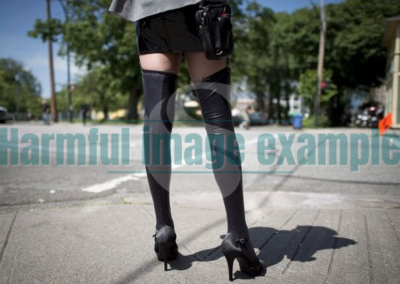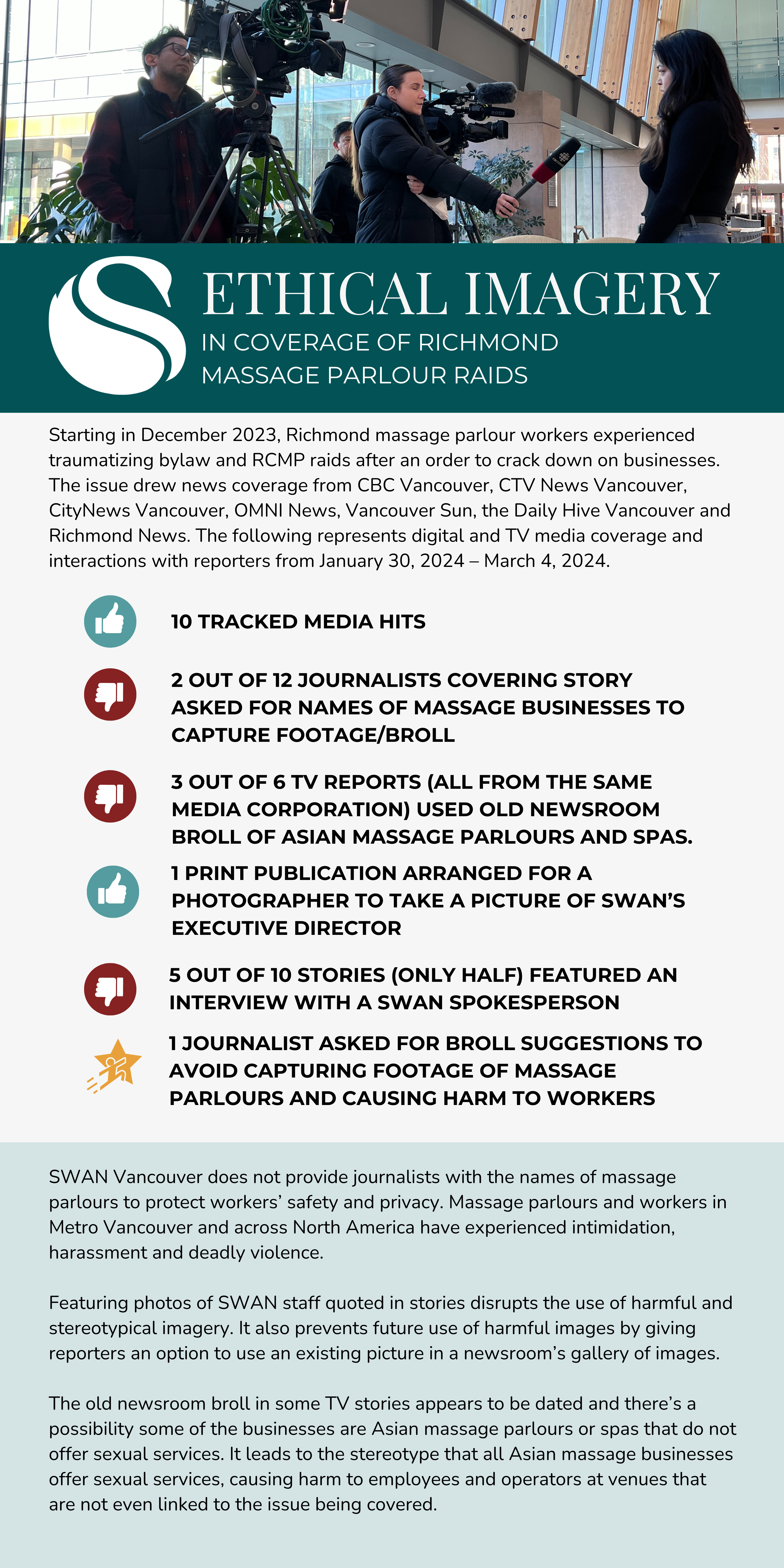-Crystal Laderas, Communications Manager
A woman stands in the middle of a dimly lit room, she leans over a bed while her high heels rest next to extra linens stored below. The light reflects against the room’s four red walls, making her tank top, skirt, and even her skin, look like a warm crimson.
“What is your impression of this photo? ” asks a SWAN Vancouver staff member while pointing to the TV screen.
“Terrible photo, no privacy. This photo does not show the face of the woman but shows the phone number. This type of photo should never be on the news,” said Olivia, a massage parlour worker who is using a pseudonym to protect her identity.

Olivia is part of a focus group of Asian immigrants and migrants engaged in indoor sex work who are informing SWAN’s Ethical Imagery resource. The aim was to create a gallery of stock images (featuring models in place of sex workers) on ResponsibleReporting.ca which would encourage reporters to adopt ethical and evidence-based reporting on sex work. Journalists could use these photos instead of the stereotypical images currently attached to reports on sex work. In 2023, SWAN collected approximately four dozen images published by Canadian outlets from March 2020 to March 2022.
“Images like these dehumanize sex workers and perpetuate stereotypes,” says Victoria Curtis, Project Manager. “They typically include fishnet stockings, stiletto heels and obscured faces as they focus only on body parts. All of this erases the person and all of her nuance and complexity as a human being trying to earn income. It makes it harder for news consumers to understand sex workers as normal community members, who are just like anyone else.”
“The photos should convey that their work is just a normal, ordinary service. As long as people won’t look at the photos and come away with a biased perception of the industry, then I think it is okay,” explained Mya, another massage parlour worker and focus group participant using a pseudonym to protect her identity.
In the fall of 2023, two im/migrant women that SWAN supports agreed to work as creative directors for a photojournalist who would capture images for the Ethical Imagery gallery. But insight from the photographer prompted SWAN to drop plans for the photoshoot.
“We realized without the fishnets, high heels or something a little stereotypical in the images, newsrooms would not attach these photos to their coverage of massage parlours and the im/migrant women who work there,” said Victoria Curtis, Project Manager. “Images of women walking along the seawall, holding a briefcase or going to a playground with their child is not what newsrooms or the public pictures when they think about sex workers.”
Pivoting away from the stock photo shoot, SWAN pursued a multimedia article that would include women’s recorded voices and their criticisms of imagery used in media reports.
“Can I come in wearing sunglasses and a hat?” asked one woman. “Is it okay if I wear a mask too?”
It’s was no surprise that no one wanted to be recorded. It took about 20 years of outreach work to massage businesses for workers to feel comfortable enough to meet us at our Yaletown office to pick up safer sex supplies and attend Peer Program activities. Even now, they cover their hair and faces and look down when they reach our building’s exterior security camera so that even their eyes can’t be captured on surveillance video. These women duck, hide and make sacrifices every day to avoid detection. Not only can they be charged under Canada’s criminal laws, migrants can also be deported under the Immigration and Refugee Protection Regulations just for doing sex work.
“We cannot recreate the oppression this community faces,” said Kelly Go, Program Manager. “They hide because we are working within a system of criminalization, racism, sex work stigma and anti-migrant sentiment. Being ethical and ensuring that we are centring the women requires an intersectional approach – we can’t pretend the system of oppression does not exist and then go ahead and create a multimedia article or ethical images newsrooms wouldn’t use.”
If we want to improve the lives of im/migrant sex workers, we need their perspectives and lived experience to inform our advocacy including SWAN’s Responsible Reporting project – but this work can’t put them in a position where they fear their safety or privacy is at risk. We also have to admit we don’t have a solution to the lack of ethical imagery related to sex work. If newsrooms use photos to signal what a story is about, then those images will inevitably include stereotypical elements that audiences link to sex work – the salacious images are here to stay. Images depicting sex work in the media may not get any better until the reporting and society’s views on the industry improve.
And so we pivoted, again. This turn in the project demonstrated the importance of self-reflection in solidarity with the im/migrant sex workers we support.
So we leave you with this blog post, with no recorded voices and no picturesque photos by the seawall, just words.
But more importantly: no fishnets or stilettos.
Ask these questions about images:
- Have I thought about the impacts of this photo before publishing it?
- Does this photo accurately enhance and/or convey the idea used in my storytelling?
- Does this photo push stereotypes about an already marginalized group of people?
- Is the photo conveying what the story is trying to get across?
- Can this photo create a situation that leads to sensationalist reporting?
- How would this photo make a sex worker feel – about themself and how society thinks of them?
The ResponsibleReporting.ca project has been funded by Women and Gender Equality Canada.













